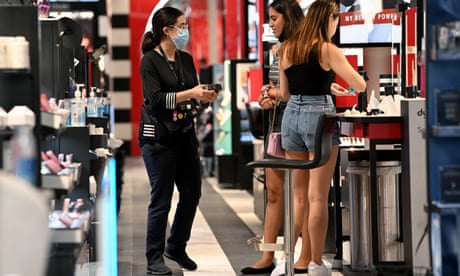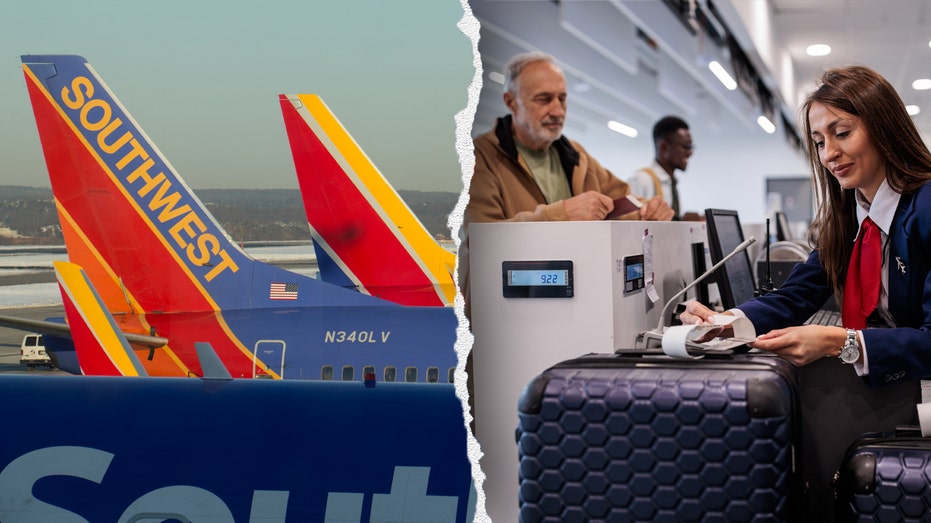- by foxnews
- 14 Mar 2025
Australia’s supply chain issues likely to continue despite drop in Covid cases
Australia’s supply chain issues likely to continue despite drop in Covid cases
- by theguardian
- 13 Feb 2022
- in news

Shoes, women's fashion and stationery are just some of the goods Australian shoppers face difficulty finding on shelves as an international shipping crisis sparked by the Covid-19 pandemic shows little sign of abating.
While Covid cases are dropping, Australian retailers have warned supply chain issues are expected to continue for up to 18 months.
"This is due to the sheer volume of products and supplies within the global supply chain and the profound shortage of freight space on ships, shipping containers and pallets exacerbated by the limited flights into the country," the chief executive of the Australian Retail Association, Paul Zahra, said.
The continued high price of shipping, together with ongoing uncertainty about when goods ordered from overseas will arrive, has forced Australian importers to order further ahead. That is putting pressure on their businesses at a time when many are already reeling from the direct impact of lockdowns over the past year as well as January's "shadow lockdown", caused by people staying home in a bid to avoid the highly contagious Omicron strain.
Zahra said retailers were reporting a sevenfold increase in supply chain costs and ordering times from overseas that have doubled or tripled.
"The other cash flow impact is retailers having to order and pay much earlier for stock - often as a leap of faith, given the uncertainty in the current market when it comes to customer sentiment and expectations," he said.
ARA members report that they are ending up with either not enough stock or stock arriving at the wrong time - a particular problem in highly seasonal sectors like footwear and frocks, which depend on the weather, and stationery, where sales are given a large bump by the back-to-school rush at the beginning of the year.
The organisation has called on the Morrison government for help. In a submission ahead of next month's federal budget, the ARA urged the government to bring back cash grants for at-risk businesses, reintroduce rent reductions that applied during lockdowns, and give out free rapid antigen tests so that companies can test their employees.
Carlos Villazon, the managing director of Stelno Logistics, said transporting a 40ft (12.2m) long shipping container - the most common size - to Australia used to cost between US$1,000 and US$1,500, but over the last year the price had blown out tenfold.
He blamed shipping companies for the surge. While price-fixing cartels are illegal in Australia, international shipping companies are allowed to set prices collectively using an exemption that the chair of the Australian Competition and Consumer Commission, Rod Sims, has repeatedly called on the government to repeal.
"All these shipping lines are registered to countries such as Panama, Mexico, the Dominican Republic and things like that, so they're not really regulated," Villazon said.
"So essentially, they're modern day pirates at the moment because the prices are not really controlled or regulated by any government."
He said Australian importers also suffered because global ship operators consider Australia a "very small piece of the pie".
"The amount of vessels they have allocated to Australia is quite minimal compared to other trade links like China to Europe and China to America," he said.
"Think about it logically - why would you assign all your fleet to our trade lane when you can make double the amount of revenue in other trade lanes?"
Adding to the bottleneck caused by shipping's slowdown, Omicron has wreaked havoc in onshore warehousing and distribution. Villazon said up to half the staff in Stelno's three distribution centres were off work at any one time.
However, he said the longer delivery pipeline also meant businesses need "to have positive cash flow to be able to purchase ahead and have larger inventory holdings".
As a result, companies - including his - are turning to invoice financing, a form of borrowing which has been unpopular for about a decade.
Also known as factoring, invoice financing involves cashing in orders from your customers at a discount - typically, about 80% of face value - in return for immediate money from a bank or other financial institution.
It is the mirror image of the cash flow financing, or "reverse factoring", offered by Greensill Capital, the once high-flying finance group run by Bundaberg sugar farmer Lex Greensill, which collapsed messily last year.
Invoice financing also has risks. Australia's biggest bank, the Commonwealth Bank of Australia, shut down its invoice financing division after it loaned more than $40m to Viking Group, a trucking company linked to the Comanchero motorbike gang.
Viking collapsed in 2011 and two of its executives, Steve Iliopoulos and Vasilis "Bill" Bariamis, together with Bariamis's wife, Loukia, were sent to jail after being found guilty of fraud against the CBA in 2016.
But, lured by the boom in demand, the CBA is now back in the factoring business, and financiers say the use of technology that enables them to keep a close (and automated) eye on their customers' financial performance has made their systems far less vulnerable to fraud than the largely paper-based system used a decade ago.
Daniel Riley, the chief executive of Earlypay, which Stelno uses, said the demand for invoice financing came from businesses who can't find suppliers.
"And when they do, suppliers are changing their credit terms to earlier payment, so there is a cash crunch we have with businesses that would otherwise be growing," he said.
The result has been that clients are borrowing more as sales boom.
Riley said sales among Earlypay clients were up 19% in December compared with the previous year. "But just to illustrate the restraint on cash, in December 2020 clients were on average drawing 53% of their total receivables, and in December 2021 that increased to 61%," he said.
"That's about as high as it can get."
CBA's head of small business banking, Clare Morgan, said the bank was expanding its invoice finance product, Stream, which it started rolling out last year, as customers grappled with cash flow issues caused by the supply chain crisis.
"I heard a lot of customers say to me, you know, I used to develop deep and narrow relationships with my suppliers and I would source inventory and stock on a just-in-time basis," she said.
"But guess what, now I'm diversifying my relationships and I'm making sure that I've got lots of suppliers because I don't know if they're going to be reliable.
"And I'm also moving to a 'just-in-case' inventory management system, which means I'm holding more stock, which is tying up my working capital."
- by foxnews
- descember 09, 2016
Southwest flyers fire back over airline ending free checked bag policy: 'Nail in the coffin'
Southwest has customers sounding off after the airline announced an end to its checked bag policy, leading some flyers to say they'll "boycott" the airline.
read more


